Filing an Initiating Application for parenting orders can feel urgent and overwhelming especially when children are involved. However, many parents are surprised to learn that…

What is spousal maintenance?
Spousal maintenance is often confused or likened to Child Support, however, these concepts are unique and very different from the other. Spousal maintenance, unlike Child Support, relates only to the support of your former partner.
You may have a responsibility to financially support your ex-partner after separation or divorce.
In Queensland, de facto partners may well have no right to maintenance if they separated before 01 March 2009. New legislation since this time means that this is not the case if you separated after this date. Your future needs can now be considered when property and other assets are divided.
In most cases, it should be remembered that the Court requires you to make an effort to resolve disputes before you initiate proceedings with the Family Court. This generally involves the parties attending a dispute resolution session with a trained professional. We can assist with dispute resolution services. If you cannot agree, you can apply to the Court for a financial order.
Navigating Spousal Maintenance in Queensland: How James Noble Law Can Assist You
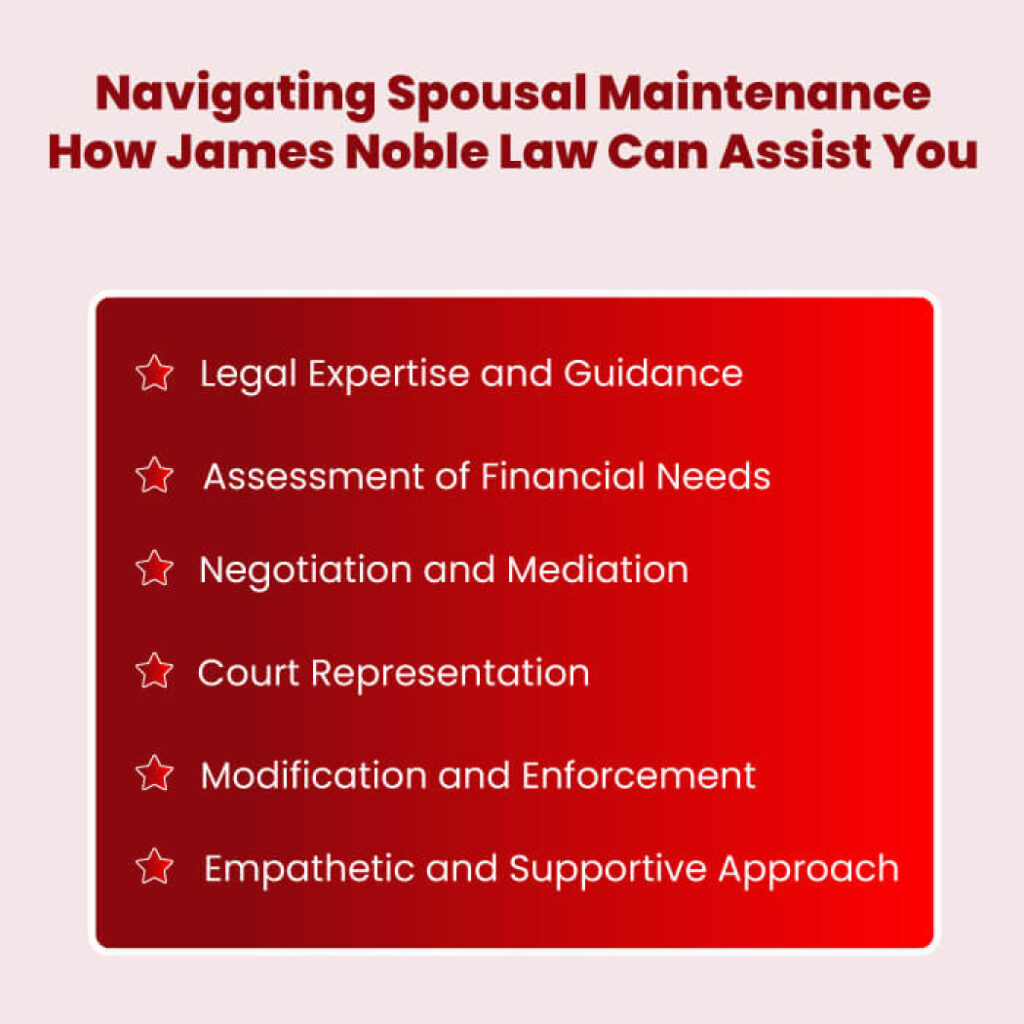 Divorce or separation is a challenging time, often accompanied by financial uncertainties, especially when it comes to spousal maintenance. In Queensland, understanding the legal nuances surrounding spousal maintenance can be complex.
Divorce or separation is a challenging time, often accompanied by financial uncertainties, especially when it comes to spousal maintenance. In Queensland, understanding the legal nuances surrounding spousal maintenance can be complex.
However, with the right legal guidance from a reputable law firm, navigating through this process can be made more manageable.
- Legal Expertise and Guidance: James Noble Law will provide clients with the necessary legal expertise and guidance throughout the spousal maintenance process. They will explain the relevant laws in Queensland regarding spousal maintenance, ensuring clients understand their rights and obligations.
- Assessment of Financial Needs: One of the key roles James Noble Law is to help clients assess their financial needs post-separation. They will work closely with clients to gather relevant financial information, including income, assets, and expenses. By conducting a thorough assessment, the law firm can determine whether spousal maintenance is appropriate in a particular case.
- Negotiation and Mediation: In many cases, spousal maintenance issues can be resolved through negotiation or mediation rather than litigation. James Nobe Law will represent their client’s interests during negotiations, aiming to reach a fair and amicable agreement with the other party. Through effective communication and negotiation techniques, they can strive to achieve a favourable outcome for their client.
- Court Representation: If spousal maintenance disputes cannot be resolved through negotiation or mediation, legal proceedings may be necessary. In such instances, James Noble Law will provide strong representation in court. They will prepare and present a compelling case on behalf of their client, advocating for a fair spousal maintenance arrangement based on the individual circumstances of the case.
- Modification and Enforcement: Life circumstances can change after a spousal maintenance order is issued. James Noble Law will assist clients in seeking modifications to existing maintenance orders if there has been a significant change in circumstances, such as loss of employment or an increase in expenses. Additionally, they can help enforce spousal maintenance orders if the other party fails to comply with their obligations.
- Empathetic and Supportive Approach: Dealing with spousal maintenance issues can be emotionally taxing for clients. James Noble Law will provide empathetic support to their clients throughout the process, offering a shoulder to lean on during challenging times. They will listen to their client’s concerns and provide reassurance, helping them navigate through the legal complexities with confidence.
James Noble Law can play a crucial role in assisting clients with spousal maintenance matters in Queensland. From providing legal expertise and guidance to negotiating agreements and representing clients in court, a skilled legal team can help alleviate the stress and uncertainty associated with spousal maintenance disputes. By choosing the right law firm, clients can have peace of mind knowing that their interests are being protected, and their financial needs are being addressed in a fair and equitable manner.
Can a party apply for spousal maintenance in the Court seeking financial support?
Similar to child maintenance applications, a party can apply for spousal maintenance in the Court seeking financial support until all issues in the Court have been resolved. A spousal maintenance application can be made in its own right. It is not necessary to seek other financial relief from the other party.
The Courts consider the income levels of both parties and the expenditure of each party for their day-to-day living and other expenses. If a person does not have the income to meet his or her day-to-day living expenses or reasonable expenses, then that party has a need.
If the other party has an income greater than his or her day-to-day living expenses or other expenses, then that party has the capacity to assist the other party financially until matters are resolved.
In such circumstances, the Court can order the party with the financial capacity to pay spousal maintenance to the other party. Normally spousal maintenance ceases when financial issues have been resolved or negotiated.
Do Spouses have any duty on financial support in Australia?
Under the Family Law Act 1975, both spouses have a duty to support and maintain the other, even after you have separated or divorced. For a Court to make an Order that one spouse financially supports the other for a period of time the following factors need to be weighed:
- Whether one spouse (the Applicant) is unable to adequately meet his or her own reasonable financial needs. This means their income (excluding any Centrelink pension) does not amount to their reasonable expense; and
- The other spouse (the Respondent) has the capacity to pay. This means that the Respondent’s income exceeds their reasonable expenses.
What are the Spousal maintenance rights upon separation or divorce?
Importantly, a party of the relationship or marriage does not have an automatic right to spousal maintenance upon separation or divorce. Whether spousal maintenance can be successfully brought depends upon the individual factors of each case, the financial capability of both parties, and the evidence of your claim before the Court. In order to substantiate your claim for Spousal Maintenance, the Court should be provided with evidence such as:
- A detailed history of work you have performed during the marriage and what income was produced during this time;
- When and why you gave up work and the effect it has had on your career and future income earning capacity;
- Any serious issues which have occurred post-separation, such as health issues for yourself or children which may cause you to be unable to gain employment;
- What jobs may be available to you based on your work experience in the short and intermediate future; and
- Any expert evidence (psychologists, medical practitioners, psychiatrists) regarding issues that are impacting you and your ability to obtain employment.
This evidence is usually provided to the Court through Affidavits, Financial Statement and Applications filed prior to the hearing of the matter. When it comes to the breakdown of a relationship, typically one party has it tougher than the other, especially if that party has been the primary caregiver to the child without employment. The phrasing of the Family Law Act makes it considerably difficult for Mother’s to demonstrate they are unable to “adequately” support themselves.
In cases where one party has taken a substantially more active role in parenting the child of the relationship, and that child is now past the age of 18 and no longer requires full-time care, it can be difficult for parties to suffer a breakdown of the relationship at this time. It is not uncommon for a Mother to leave their chosen career for 20-30 years whilst the Husband has spent that time not only supporting the family financially but also building a reputation and expertise in that area of work.
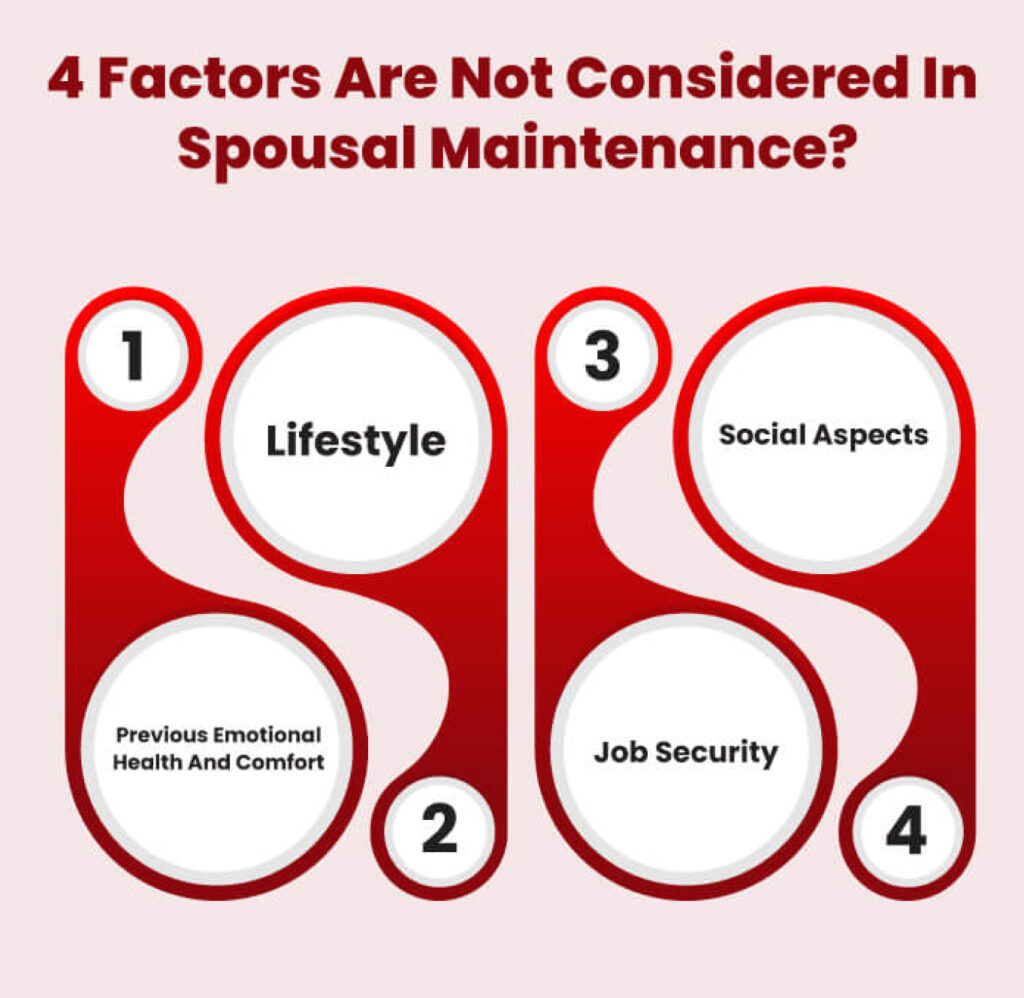 In situations such as these, the Husband has a significantly higher earning capacity moving forward whereas the Wife may struggle to re-establish herself in the workforce. Whilst it is not uncommon for the Wife to receive an additional percentage of the property to compensate for this, in circumstances where the assets of the parties are modest, this amount may not be enough to allow the Wife to live comfortably for the remainder of her life.
In situations such as these, the Husband has a significantly higher earning capacity moving forward whereas the Wife may struggle to re-establish herself in the workforce. Whilst it is not uncommon for the Wife to receive an additional percentage of the property to compensate for this, in circumstances where the assets of the parties are modest, this amount may not be enough to allow the Wife to live comfortably for the remainder of her life.
What are the Factors not considered in Spousal Maintenance?
One of the biggest problems with Spousal Maintenance under the Family Law Act is that it does not consider important factors such as:
- Previous emotional health and comfort;
- Lifestyle;
- Job security; and
- Social aspects.
What factors need to be considered by the court in dividing property?
When deciding any financial disputes after separation, the Court the principles set out in section 79(4) and 75(2) of the Family Law Act 1975 to determine what other factors need to be considered in dividing property.
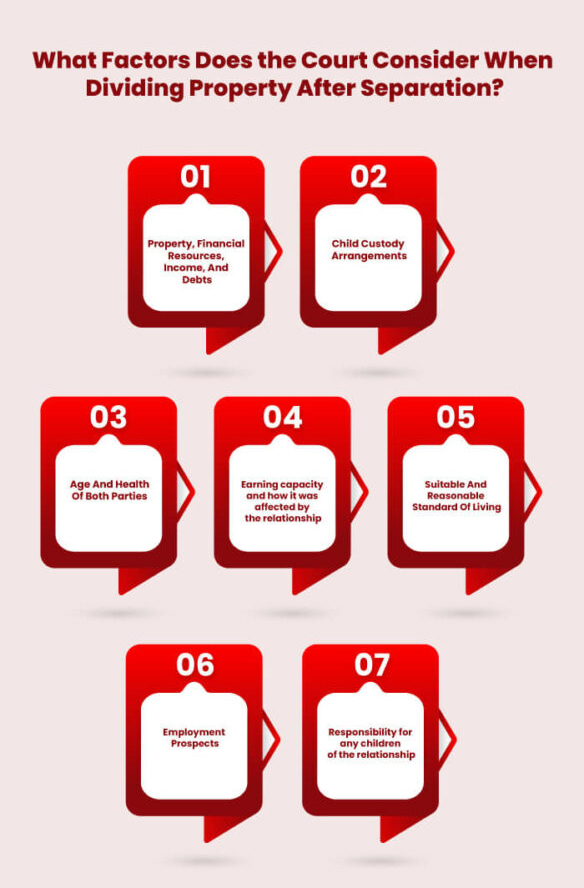 This means that the judicial officer hearing the matter (usually a Registrar and sometimes a Judge) will try to decide the basis of what is most fair and equitable, considering the following information obtained from both spouses:
This means that the judicial officer hearing the matter (usually a Registrar and sometimes a Judge) will try to decide the basis of what is most fair and equitable, considering the following information obtained from both spouses:
- Your property, financial resources, income and debts;
- Whether the children live with you and your former spouse;
- Your age and health (which helps define your future financial requirements and timeframe in which you can earn further income and superannuation;
- Your ability to earn, and whether this has been affected by the relationship;
- What is considered to be a suitable standard of living;
- The ability of the parties to gain meaningful employment;
- What the parties consider to be a reasonable standard of living;
- Health and age; and
- Any whether the parties have the responsibility for any children of the relationship.
What is Family Dispute Resolution?
Family Dispute Resolution (FDR) is a process that must be engaged with before an application can be made to the court for matters involving children. As court proceedings can be very stressful and expensive for both parties, the court requires the parties to make a genuine effort to resolve parenting issues on their own. Although there are certain situations where FDR is not required, you should seek legal advice regarding your situation.
An application for spousal maintenance may be initiated at any time within one year from the date the divorce was finalized. If you wish to make an application outside this time limitation, special permission will be needed from the court to hear the matter. As this permission is not always granted, it is important to bring applications within the required time.
Spousal maintenance will automatically cease if the recipient of the order remarries, or if either party of the maintenance dies. However, the party paying the maintenance may make an application to the court for a reduction or termination of the order if the financial circumstances are adversely affected.
This process can occur if the payer loses their current employment, or, the recipient of the maintenance has sufficient earnings through employment.
What is the duty of disclosure in family law matters?
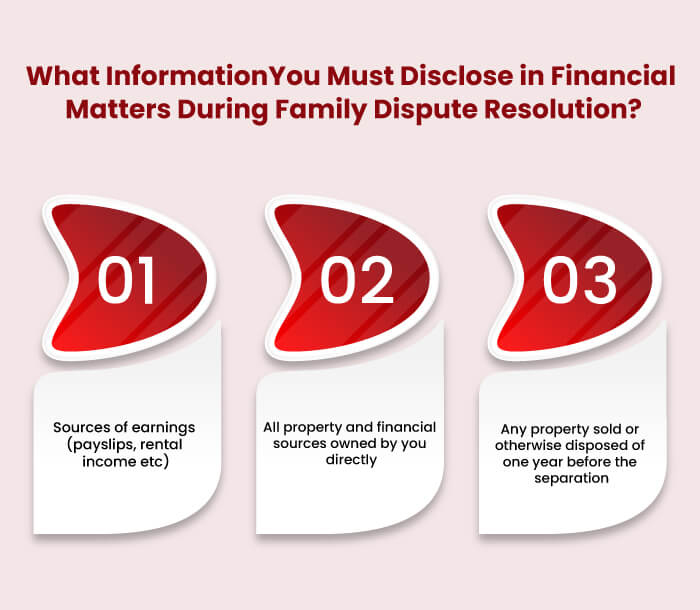 If you are party to a family law dispute, you have a duty to disclose to the court certain relevant information, whether the matter is financial or parenting related. This duty to disclose is required throughout the case, from the time before the proceedings reach court up until final orders are given.
If you are party to a family law dispute, you have a duty to disclose to the court certain relevant information, whether the matter is financial or parenting related. This duty to disclose is required throughout the case, from the time before the proceedings reach court up until final orders are given.
It is important to understand this duty, as failure to disclose could lead to lengthy delays, additional costs, and even fines.
There is a wide range of information you must disclose in financial matters, including:
- Sources of earnings (payslips, rental income etc)
- All property and financial sources owned by you directly
- Any property sold or otherwise disposed of one year before the separation.
In addition to financial documents, if your matter involves parenting arrangements, further disclosure is required detailing information of the children, including:
- Medical reports
- School reports and photographs
- Childs diaries or letters
- Emails and other social media material evidenced on the internet
As the duty of disclosure can expand over numerous documents, it is important to understand the requirements of your specific case.
If you fail to comply with the duty of disclosure or file false documentation misrepresenting your true position, the consequences can be severe. The Court may refuse you to use the false information as evidence, dismiss all or part of your case, assume your interest in any property or enforce you to pay additional costs.
If there is any evidence indicating you have intentionally hidden documentation, the Court may use discretion to make an adverse finding against your position. If you reasonably suspect the opposing party has failed to full disclosure their position, an application can be made to the Family Law Court for an order to compel the other party’s disclosure.
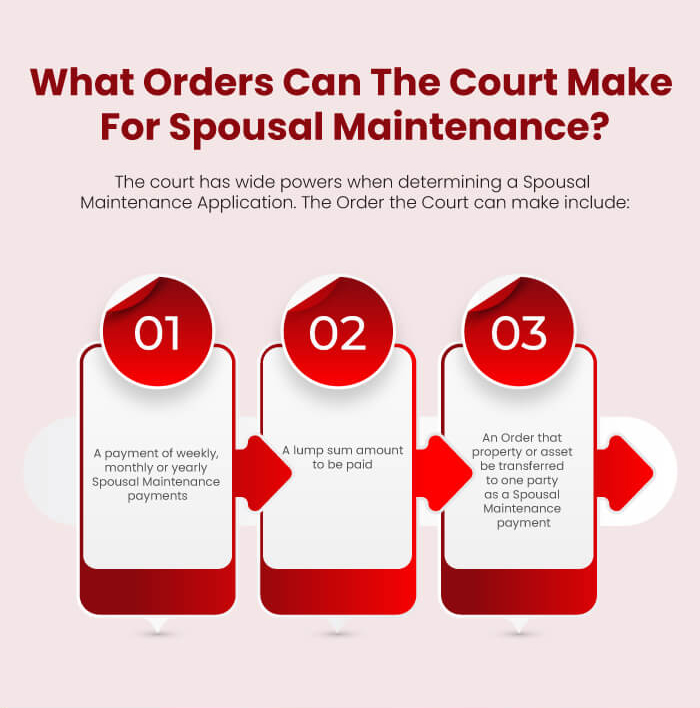 The court has wide powers when determining a Spousal Maintenance Application. The Order the Court can make include:
The court has wide powers when determining a Spousal Maintenance Application. The Order the Court can make include:
- A payment of weekly, monthly or yearly Spousal Maintenance payments;
- A lump sum amount to be paid; or
- An Order that property or asset be transferred to one party as a Spousal Maintenance payment.
Importantly, it is not necessary for the party applying for a Court Orders to exhaust all savings and assets before being entitled to spousal maintenance. This was supported in the cases of Bevan (1995) FLC 92-600 and Mitchell (1995) FLC 92-601, where the Court stated, “The days are long gone when it is necessary for an Applicant to use up all her assets and capital in order to satisfy the requirement that she is unable to support herself “adequately”. Where the line is to be drawn will depend on the circumstances of individual cases”.
A further interesting decision of the Court was made in the case of Woodgate [2014] FCCA 2419, where the Husband was a Police Officer who had been injured on duty, receiving a benefit for this until his pension activated.
The Wife brought an application that the Husband was able to pay spousal maintenance from those funds. Judge Henderson considered the 28-year relationship of the parties and the Husband’s superannuation benefit of almost $1,000,000 in conjunction with the relatively low asset pool.
The Husband’s injury was categorized as a “deteriorating mental, psychological and emotional health caused by the stress of his job”. Counsel for the Husband submitted arguments to the Court which suggested the duty pension was a personal injury claim and the Wife had only a 30% in that assets.
Counsel for the Husband relied upon the decisions of Hayton &Bendle [2010] FamCA 592, T & T (Pension Splitting) [2006] FamCA 207, and Crawford & Crawford [2012] FMCAfam 1315.
The Court found that the Wife did have an entitlement to Spousal Maintenance due to the Husband receiving this pension. As the lump sum totaled approximately $3,320, the Husband had the capacity to pay an amount from this to the Wife.
This is another example of the different approach Courts take to specific matters. There is no “one application fits all” category of Spousal Maintenance, with the Court ultimately considering the factors set out in section 75(2) of the Family Law Act 1975 (Cth) in conjunction with the application.
Another recent case considered by the Court involved an Application brought by a Mother for spousal maintenance of $100.00 per week. The child of the relationship was almost 5 years old and had not yet commenced primary school education. The Father was employed with a company utilizing an unstructured roster, which made it difficult for the Mother to arrange a regular routine for the child.
The Father contended that the Mother was fit and able to gain meaningful employment and the parties’ incomes were virtually equal. Although the Court found that the parties’ incomes were practically equal, the Court considered the fact the Mother has primary care of the child important towards the Spousal Maintenance claim.
The Court accepted that the Mother was unable to obtain employment due to the young age of the child, and therefore justified an amount of maintenance being paid to her until the child commenced school.
As the Father’s financial statements provided his weekly expenditure at $866 per week with a weekly income of $1,100, the Court has the capacity to pay the maintenance amount of $100 per week. Accordingly, the Father was Ordered to pay the Mother Spousal Maintenance in the sum of $120 per week until such time the child commenced primary school education or turned 6 years of age, which occurred first.
The limitation period for commencing a spousal maintenance application is one year from the date on which the divorce became final pursuant to section 44(3) of the Family Law Act 1975 (Cth).
If a former de facto spouse is to make an application to the Court, they must do so within two years from the date the relationship ended. If this time period has elapsed, the Court still has the discretion to hear an application, if the Applicant can show that not hearing the case would cause hardship to them or a child.
The only way to revoke or alter an Order for Spousal Maintenance is to make an application to the Court which seeks the variation of this Court document. In circumstances where a party may lose their job, the party receiving the benefit has access to a significant wealth or enters into a new matrimonial relationship with another, this may result in unfairness.
In circumstances such as these, it is best for the parties to agree to vary the existing Order without the involvement of the Court.
In circumstances where the parties are unable to agree, the Court has a wide discretion in it’s decision to either vary, suspend, terminate or continue the Order.
The only way a party can extinguish a future Spousal Maintenance claim is to enter into a binding financial agreement (BFA). These binding agreements fall outside the jurisdiction of the Court, acting a private agreement between the parties that are enforceable and willingly entered into.
On the lookout for legal support?
Your solution is here with James Noble Law! Proudly serving Expert Family lawyers in Brisbane, Family Law Specialists in Cairns, and Family lawyers in Milton, we stand as your dedicated Family Law experts. Secure a complimentary 20-minute consultation with our adept legal team – no obligations attached! Book your appointment now to connect with our experienced Family Lawyers.
Explore:
Effortlessly locate us on Google Maps and embark on the proactive journey towards resolving your legal matters. Seize this opportunity to glean insights from our seasoned professionals. Take charge today and pave the way for legal clarity and confidence!
Helpful Family Law Documents & Guides
- A Guide to Children Negotiation and Family Law
- A Guide to Property & Family Law Act Paper
- A Guide to Alternative Dispute Resolutions
- A Guide to Preparing for the unthinkable
- A Guide to Collaborative Practice Paper
- A Guide to Separation in Family Law
- A Guide to Family Law Property
- A Guide to Dispute Resolution
- A-Z Collaborative Law eBook
- A Guide to Separation
- A Guide to Children
- Arbitration eBook
Need Help?
Talk to a Noble Family Lawyer
Family Law News
Keep up to date and receive clarity on a range of news related articles on the James Noble Law blog.
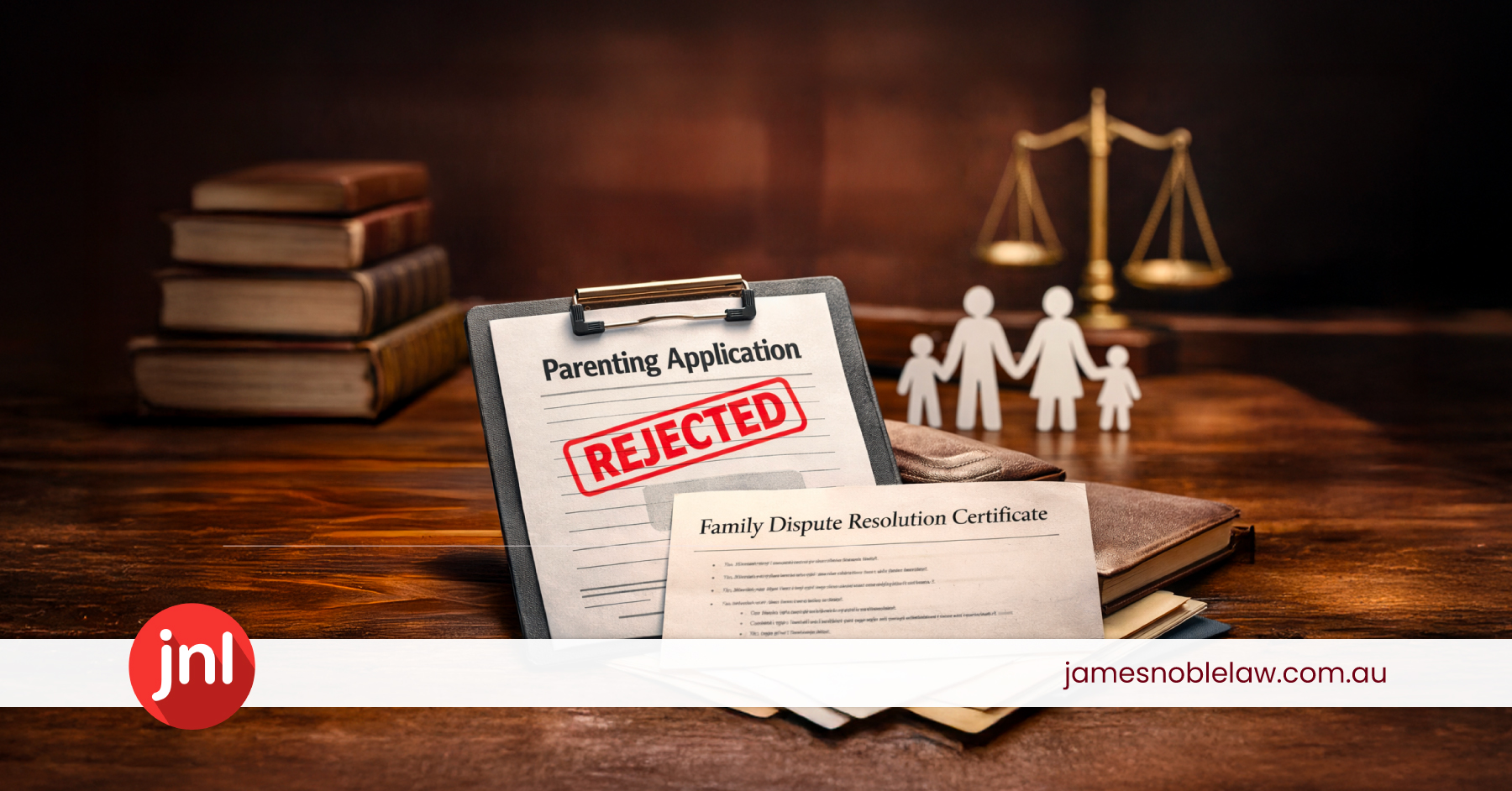

Artificial intelligence (AI) tools are increasingly being used across professional services, including the legal profession. From drafting submissions to summarising case law and preparing chronologies,…

Family law disputes are often emotionally draining, complex, and deeply personal. When you enter mediation, the goal is to resolve issues such as parenting arrangements,…



